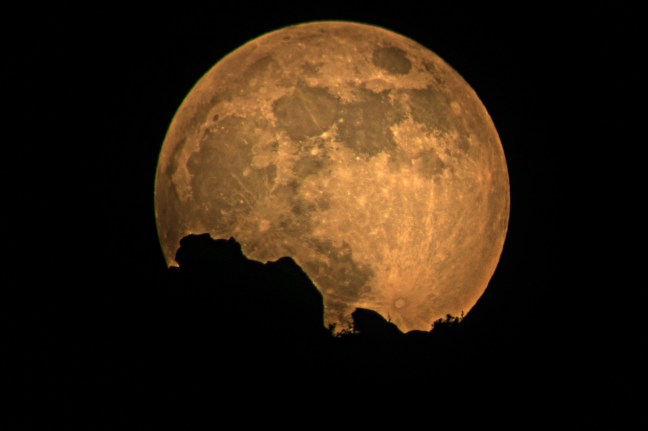
Image Description: A large, orange full moon is rising in contrast to surroundings. Black background.
She.
When I lead worship in congregational settings, I typically use gender-neutral language for God. But these days, in my own personal, spiritual practice, I use feminine language and imagery almost entirely.
It’s not that I believe God is literally female. I don’t believe God is literally male either. God is a Mystery beyond our our limited language.
But yet, precisely because God is Incarnational, God can be made known and revealed to us in our limited language, often in very intimate ways. Jesus used the personal title Abba to address God, a word that might be translated, “Papa.” I find this at once to be endearing and intimate, while revealing an orientation of trust.
Biblical scriptures are written in Hebrew and Koine Greek, and because of their particular grammatical structures, a lot of language about God gets translated into a grammatically masculine framework. (Think about languages like Spanish or German and the ways they assign grammatical gender to nouns).
Then all of that grammatical gender gets internalized inside of us. Quite naturally, we begin to make connections between that grammatical gender, our cultural understandings of gender, and God. More challenging, we take the those very cultural understandings, including distortions of masculinity, and paste them onto God. Then, we make these distortions Ultimate in our world.
When all of this happens, we stop noticing the feminine imagery for God in those very same Biblical texts. (For more on this, see Elizabeth Johnson’s enlightening book, She Who Is). Worse, we begin to connect with a god who is primarily distant, angry, and vengeful (again, distortions of masculinity) – one who wields power over others and initiates the very hierarchy by which we do the same.
So here’s a question for us:
How many of us grew up picturing God as a bearded man in the sky — perhaps even an angry, bearded man?
Most of us don’t believe in that god anymore. Thank goodness.
But even if we don’t believe in such a god anymore, this old, internalized understanding can still get in our way. It can be challenging to pray to God when that ghost of a god keeps popping up. Maybe we don’t even notice he’s there. But in conversation about God, we keep finding ourselves feeling afraid or ashamed. Or maybe prayer feels silly and embarrassing because our understanding of God, however amorphous, still feels like a cartoon or a caricature.
This can be challenging. For all of these reasons, I often encourage the people I mentor to try using feminine language for God exclusively for a while. Does it feel different? Does it open up new understandings? Does God feel closer, and less like a cartoon?
It might not be helpful for all people, but I have found it to be helpful for me. It’s just something to try. Thankfully, the God Beyond Our Understanding is quite capable of revealing Herself in our very limited language.
To close, a brief story:
If you’ve followed this blog for a while, you know that I love the moon. Referencing Harry Potter, I’ve joked that The Moon is My Patronus. Years ago, I wrote a series with photos of the moon, delving into feminist spirituality, and adding some poetry.
Years ago, I was walking around the University of Michigan campus, and in just the right place at the right time, I saw the full moon very low in the sky. In contrast to all that was around it, the moon looked so enormous, bright, and present.
And always — always! — when the moon is like this, I want to snap a really good photo of it. I always try. But you know what is true every single time? It’s utterly impossible.
Unless you have special equipment, you cannot get an adequate photo of a contrast moon because the camera does not process that contrast in same ways our brains do. Every photo looks woefully inadequate. I just cannot capture the experience.
I think God is like that. Our language and imagery is woefully inadequate. But as we open ourselves to the moment — endearing and intimate, trusting with the fullness of ourselves— She will surely meet us.
Enjoy this choral piece called “Evensong” by Stephen Paulus. The text is from Matthew Claudius.
“See how the moon has risen, among the stars that glisten high in the firmament. Dark stand the woods and silent while from the meadows island white veils of ghostly mist ascend. Now has the world grown silent, while in the evening’s twilight we find protective peace, as in our quiet chamber after much toil and labor in healing sleep we find release. Look, how the half moon shineth while from our view it hideth its fullness, round and whole. Thus many truths are hiding from utter lack of striving on our part to see them whole. The hour draws near for sleeping, and rest and in God’s keeping entrust we body and soul. Protect us, Lord from danger, keep watch o’er barn and manger and make our ailing neighbor whole. Entrust we body and soul. And make our ailing neighbor whole. See how the moon has risen.”
This is a piece on feminist spirituality. Feel free to check out the others as well:
